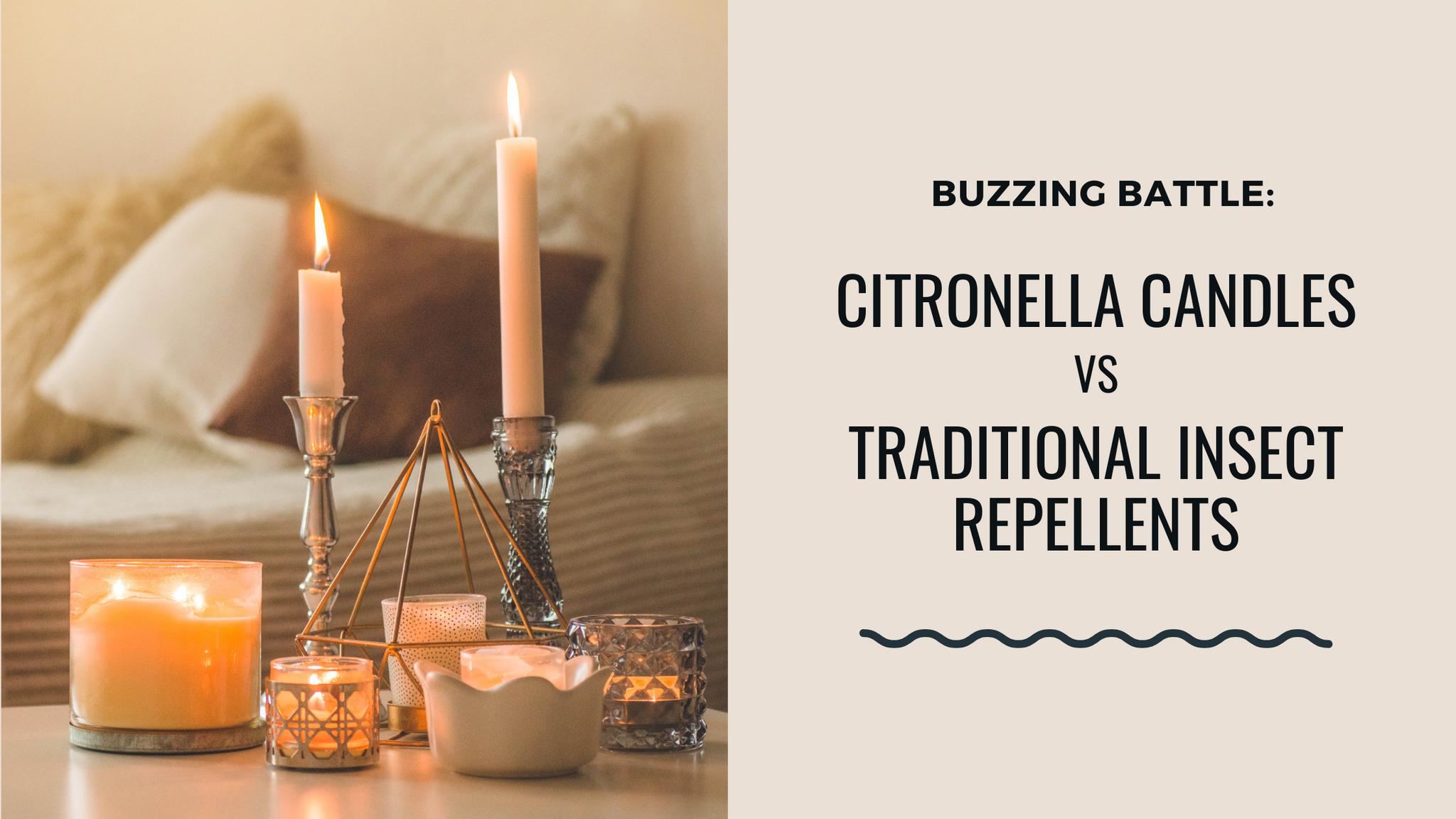Buzzing Battle: Citronella Candles vs. Traditional Insect Repellents
Summer nights – the perfect time for outdoor gatherings, backyard barbecues, and starlit strolls. But along with the warm weather comes an unwelcome guest: mosquitoes. These pesky insects can quickly turn a pleasant evening into an itchy nightmare. That's where insect repellents come into play. Today, we're diving into the age-old debate: Citronella Candles vs. Other Insect Repellents.
Let's start with citronella. This fragrant oil is derived from lemongrass and has been used for centuries to ward off insects. Citronella candles work by releasing the scent of citronella into the air, which masks other attractive scents for mosquitoes and confuses their ability to locate targets. While they're a staple of many outdoor gatherings, do they really work? We'll explore that shortly.
But let's not overlook the competition. There's an array of options to combat those pesky bugs. From sprays to lotions to coils, the market offers a variety of solutions. These repellents often contain active ingredients like DEET, picaridin, or permethrin. Each ingredient comes with its own advantages and drawbacks. But do they outperform our reliable citronella candles? Here's a breakdown:
DEET-based Repellents: DEET is one of the most common active ingredients in insect repellents. It's highly effective against a wide range of insects, including mosquitoes, ticks, and flies. However, some people may experience skin irritation or other adverse reactions with prolonged use.
Picaridin Repellents: Picaridin is a synthetic compound that's becoming increasingly popular as an alternative to DEET. It's effective against mosquitoes and other biting insects without the greasy feel often associated with DEET-based products. Picaridin is generally considered safe and less likely to cause skin irritation.
Permethrin-treated Clothing: Unlike topical repellents, permethrin is applied directly to clothing and gear. It effectively repels mosquitoes, ticks, and other insects on contact. Permethrin-treated clothing remains protective through multiple washings, making it a long-lasting solution. However, it's important to follow application instructions carefully to avoid skin exposure.
Essential Oil-based Repellents: Some repellents utilize natural essential oils like eucalyptus, lemon, or lavender to deter insects. While these products may be appealing for their natural ingredients, their effectiveness can vary, and they may require more frequent reapplication compared to chemical-based repellents.
Coil and Incense Repellents: Coil and incense repellents work by burning or smoldering, releasing insect-repelling chemicals into the air. While convenient for outdoor use, they may pose respiratory risks with prolonged exposure to smoke. Additionally, their effectiveness can be limited to the immediate area where they're burning.
Comparison of Effectiveness
Studies have attempted to determine which repellents reign supreme in the battle against bugs. However, real-world experiences and testimonials provide valuable insights into what truly works when the mosquitoes start buzzing. Here's what we've found:
DEET vs. Citronella Candles: Research suggests that DEET-based repellents generally offer longer-lasting and more comprehensive protection compared to citronella candles. While citronella candles may provide some relief in small outdoor areas, they're typically less effective at repelling a wide range of insects over extended periods.
Picaridin vs. Citronella Candles: Similar to DEET, picaridin-based repellents tend to outperform citronella candles in terms of efficacy and duration of protection. Picaridin is often preferred for its non-greasy feel and lower risk of skin irritation, making it a popular choice for those seeking an alternative to DEET.
Permethrin-treated Clothing vs. Citronella Candles: Permethrin-treated clothing offers a highly effective barrier against insects, including those that may not be deterred by citronella candles alone. While citronella candles can enhance outdoor ambiance, permethrin-treated clothing provides reliable protection even in heavily infested areas.
Essential Oil-based Repellents vs. Citronella Candles: While essential oil-based repellents may offer a natural alternative, they often fall short in terms of effectiveness and longevity compared to citronella candles and chemical-based products. Frequent reapplication may be necessary to maintain adequate protection.
Coil and Incense Repellents vs. Citronella Candles: Coil and incense repellents provide localized protection in outdoor settings but may not offer the same level of effectiveness as citronella candles or topical repellents. Additionally, concerns regarding smoke inhalation and respiratory health should be considered when using these products.
In the battle of bug repellents, the choice ultimately depends on your preferences, needs, and the level of protection required. Whether you opt for the convenience of citronella candles or the reliability of chemical-based repellents, staying informed about the available options is key to enjoying your outdoor adventures bite-free!
When it comes to fending off insects, safety is a top priority. Let's take a closer look at the potential risks associated with both citronella candles and traditional repellents, along with regulatory oversight and safety standards. Here are some key points to consider:
Toxicity and Fire Hazards of Citronella Candles: While citronella candles are generally considered safe when used as directed, there are potential hazards to be aware of. The citronella oil used in these candles can be toxic if ingested in large quantities, especially for pets and small children. Additionally, the open flame poses a fire hazard, particularly in outdoor settings where conditions may be windy or dry.
Skin Irritation and Allergic Reactions with Traditional Repellents: Traditional insect repellents containing chemicals like DEET, picaridin, or permethrin may cause skin irritation or allergic reactions in some individuals. It's important to follow application instructions carefully and perform a patch test before widespread use, especially for those with sensitive skin or allergies.
Regulatory Oversight and Safety Standards: In many countries, including the United States, insect repellents are regulated by government agencies such as the Environmental Protection Agency (EPA) or the Food and Drug Administration (FDA). These agencies establish safety standards and guidelines for the manufacturing, labeling, and use of insect repellent products to ensure consumer safety. When choosing a repellent, look for products that have been registered or approved by these regulatory bodies.
Children and Pet Safety: Extra caution should be exercised when using insect repellents around children and pets. Keep repellent products out of reach of children, and avoid applying them to their hands, as they may inadvertently ingest the chemicals. When using repellents on pets, choose products specifically formulated for their species and follow dosage instructions carefully to prevent adverse reactions.
By being aware of these safety considerations and following recommended guidelines, you can effectively protect yourself and your loved ones from insect bites while minimizing potential risks. Always prioritize safety when selecting and using insect repellent products, and consult a healthcare professional if you have any concerns or experience adverse reactions!
Environmental Impact
Beyond personal safety, we must also consider the impact on our environment. Citronella cultivation, carbon emissions from candle production, and waste management all contribute to the environmental footprint of insect repellents. We'll weigh these factors against the environmental impact of other repellents to determine which option is more eco-friendly!
So, which side of the fence should you land on in the Citronella Candles vs. Other Insect Repellents debate? While both have their merits, it ultimately comes down to personal preference and specific needs. As technology advances, so too do our options for bug repellents. Whatever your choice, remember to stay informed and make decisions that align with your values and circumstances. After all, nobody wants to spend their summer swatting away mosquitoes!
















